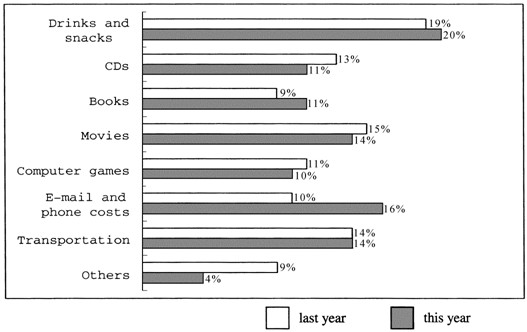题目内容
|
| 1-5 BCADB 6-10 ABBCD |

练习册系列答案
相关题目
2. Lin Tao likes _____ very much.
A. Chinese
B. math
C. the English corner
B. math
C. the English corner
3. Lin Tao thinks the English corner is _____ to him.
A. good
B. helpful
C. bad
B. helpful
C. bad
4. _____ English is very poor.
A. Long Hongfang's
B. Lin Tao's
C. My
B. Lin Tao's
C. My
5. Long Hongfang and Lin Tao are _____.
A. good friends
B. in different classes
C. in the same class
B. in different classes
C. in the same class
| 完型填空。 | |||
| Amy is 13. She lives __1__ her parents in Suzhou. She is in Grade 7. From Monday __2__ Friday, she goes to school. And she usually __3__ school clothes. There are lots of nice people in her class. Millie her best friend, always __4__ games with her at lunchtime. They both enjoy __5__ the songs of Jay Zhou. She is very busy now. Tomorrow is New Year's Day. They are going to __6__ it in their classroom, __7__ Amy and Millie are going to the supermarket. They want to buy some __8__: sweets, chocolates, lemons and pears for their classmates. Amy often ate chocolates before, but now she __9__ eat them any more because she wants to be healthier. Millie loves pears. She is going to buy five __10_ of them. | |||
| ( )1. A. and ( )2. A. on ( )3. A. in ( )4. A. plays ( )5. A. listening ( )6. A. celebrate ( )7. A. because ( )8. A. food ( )9. A. don't ( )10. A. pieces |
B. with B. at B. wear B. play B. hearing B. wait for B. so B. clothes B. doesn't B. bottles |
C. without C. to C. put on C. playing C. listening to C. talk about C. but C. drink C. isn't C. pairs |
D. in D. and D. wears D. played D. listen to D. sing D. and D. books D. didn't D. kilos |
| 完形填空。 | ||||
| Hello, everyone. My name is Jim. I'm a student. Our classroom is big and nice. There are 1 pictures on the walls. We have thirty desks and chairs 2 the room. They are for the 3 . There are 4 Chinese and science books in my desk. There are colored pictures 5 the science books. I come to school 6 7:30 a.m. I 7 three lessons in the morning and three in the afternoon. I like history, science and some other subjects. I 8 my homework on the computer. I'm good 9 sports. And I love 10 basketball very much. | ||||
|
 nday to Friday. On weekdays he gets up at six and ___3__
nday to Friday. On weekdays he gets up at six and ___3__  reading some books on computer. He __10___ watches TV.
reading some books on computer. He __10___ watches TV.